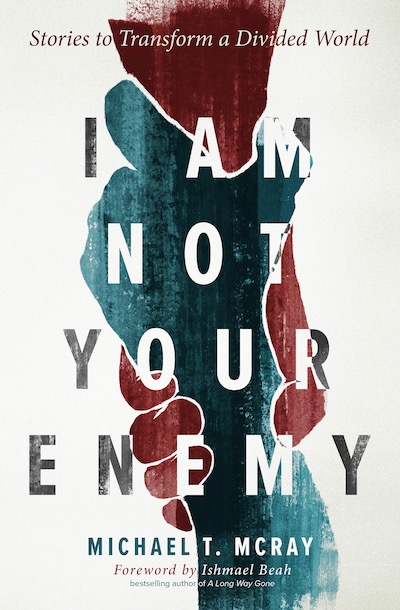EDITOR’s NOTE: The fourth letter in our series this week is a text from the opening pages of Michael T. McRay’s remarkable and inspiring new book, I Am Not Your Enemy. While reading Michael’s book—then interviewing him about the global story-collecting project behind this book—it became obvious that there were many parallels between Michael’s work and our own 10 Principles that we posted online in 2007, when our publishing house was founded. So, we are sharing this “letter” from Michael (from his book’s Introduction) as an invitation for our readers to learn more about Michael’s important and innovative work. You can do that right now by visiting his website and by ordering a copy of his book.
.
By MICHAEL T. McRAY
Author of ‘I Am Not Your Enemy‘
I believe that some of the highest goals of storytelling, of crafting narratives about our lives, should be cultivating empathy and telling the truth in service of reconciling relationships.
Stories are powerful, muscular devices. Storytelling can transform us, whether toward better or worse versions of ourselves. The stories we tell and the ones we listen to change us all the time, in large and little ways, and we’d do well to consider carefully which stories win our attention.
We are wise to consider carefully how we might learn to live together well with those we find difficult. It’s no great feat to enjoy living next to people you enjoy. That doesn’t make for peace. What makes for peace is the capacity to live with difference in such a way that bears fruit rather than arms. Difference and disagreement are guaranteed for human relationships. More often than not, it’s how we deal with difference, rather than being different, that determines our potential to be peaceable.
There’s an old Irish saying: Ar scath a cheile a mhaireas na daoine. Irish poet and theologian Padraig O Tuama says one could translate it as “It is in the shelter of each other that the people live.” Another way is: “It is in the shadow of each other that the people live.” There’s wisdom in those twists, not the least of which being that they tell us we can choose how we live together. Will we give shelter and welcome to each other, or will we let our shadows blot each other out? The stories we tell are part of how we make that choice.
The stories we tell either help us or harm us. No narrative is neutral. The ones that help are usually ones that tell bold truths about our world, even painful ones, because we always need to face the truth with courage if we’re to heal and grow. The ones that hurt are usually ones that distort truths—maybe to protect power, or dehumanize, or tempt us to weaponize our fear. We humans tend to do our worst when we’re afraid. Fear leads to hatred and hatred leads to violence and violence leads to fear, which leads to hatred, which leads to violence. If we don’t address this deadly cycle, it can loop forever.
The stories that might save us from this are stories that open us toward a fuller embrace of the world. These stories must, therefore, tell the truth. And part of the truth is that the world is full of violence, bereavements and terrors that will terrorize even our dreams.
And yet the agony of the world isn’t the truth of the world; it’s only part of the truth. Another part of he truth is that the world is full of beauty, friendship and healing. The earth is populated with powerful stories of ordinary people doing extraordinary things, of inconceivable reconciliation, of faith and hope and love. Yet for some reason, we seem uninterested in these stories or are unwilling or unable to give them a platform. It seems that horror sells better than hope.
We have to do better. The stories we tell inform the breadth of our imaginations. Stories can help foster creative and prophetic imagination; they help us find order and meaning within chaos, help us get our bearings when we feel lost. And stories can also foster bigotry, prejudice, and narrow-mindedness when told without wisdom.
Wise stories, however, are those that know that sometimes someone else might tell it differently. Wise stories know there is never one villain and never one hero. Wise stories know that sometimes, maybe even most times, people can be both. Wise stories know that if you describe characters as demonic, listeners will likely long for their destruction rather than redemption. Wise stories know that the wisest stories are not told by people in power.
Wise stories are ones that help us face the truth around us and name it for what it is. Throughout Padraig O Tuama’s book, In the Shelter, he offers the simple tool of naming the truths around us and saying hello to them. Rather than pushing them away or pretending they aren’t there or have no power, he encourages us to acknowledge them. Greet them. Say hello. See what we might learn from the situations and the strangers we did not choose—or at least did not know to name. I use this all the time now in my life as a way of acknowledging often unacknowledged truths, as a way of becoming familiar and maybe even friendly with what can be frightening.
Because sometimes, simply saying hello might be part of what helps us.
This brief excerpt is from Michael’s much longer, prophetic Introduction to his new book. The entire Introduction reads like an open letter to all of us to recognize the peacebuilding potential in sharing wise and true stories.
- From Lucille Sider: ‘You are not alone.’
- From Larry Buxton: ‘A better way to win’
- From Duncan Newcomer: ‘Do we need another Lincoln?’
- From Michael T. McRay: ‘The stories that might help save us’
- From Rabbi Bob Alper: ‘And, I’ll take a side of laughter with that, too, please.’


